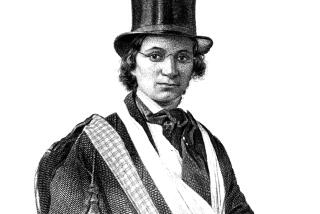Power, slavery and a president
Slowly, year by year, book by book, we are recovering the suppressed story of how Southern planters and their enslaved men and women lived together. With the publication of Henry Wiencek’s “An Imperfect God: George Washington, His Slaves, and the Creation of America,” the momentum of this recovery of a hidden side of our history is picking up.
In a last will and testament written five months before his death in 1799, George Washington arranged for the manumission of his 124 slaves. “Arranged” is the right word, for Washington knew all too well the stratagems his heirs and executors would use to evade his intentions. Despite this stunning rejection of the slave edifice of Southern society, Washington spent much of his life behaving like a typical planter: selling and threatening to sell his slaves, having them whipped, recapturing them and dispatching them to West Indian death traps and using his lordly power to punish and reward. He once even organized a raffle of slaves to settle a debt. Deemed a humane master, he nonetheless kept his field hands in rags with little in the way of protection from the elements, in either shelter or bedding.
The quickening of Washington’s conscience infuses Wiencek’s study with acute tension, for Washington vacillated about slavery during the last four decades of his life. The struggle began with his marriage to Martha Dandridge Custis. She brought the wealth of her father and her deceased husband to Washington, lifting him into the upper tier of Virginia’s elite. In addition to farm laborers for his extended holdings, he could now assign personal attendants to himself, his wife and his two stepchildren, heirs of the Custis fortune. No consumption was more conspicuous in Tidewater, Va., than an entourage of slaves, preferably light-skinned mulattoes. Washington learned to indulge these tastes, ordering an elegant carriage from England, to be attended by liveried slaves, soon after his wedding. A love of luxury and the desire to cut a figure ensnared him in the Southern grandees’ grandiose way of living, along with the assumptions thought to justify human bondage.
The Revolution tested one of those assumptions: that slaves were incapable of valor in battle. Free African Americans served in Minutemen units and fought at Lexington, Concord and Bunker Hill, shocking their new general with the sight of black men in arms. After the outburst of patriotic zeal in 1775, the Continental Army suffered a chronic shortage of men. Northern and Southern leaders alike refused to enlist slaves, fearing to degrade the role of soldier, but free blacks volunteered and were integrated into the fighting force. A Massachusetts regiment that included black sailors ferried Washington’s entire army from Brooklyn Heights to Manhattan, an astounding evacuation feat, in the summer of 1776. Five years later, Washington chose the First Rhode Island Regiment, which was 75% black, to attack a formidable British redoubt at Yorktown in the final days of the war.
During the war, Washington also encountered his first champions of abolition, right in his own headquarters. Both John Laurens, an ardent reformer from the bosom of South Carolina’s planter elite, and the Marquis de Lafayette sought Washington’s support for emancipation projects. Initially encouraging, Washington temporized with both men, no doubt checked by his dependence on his own slaves to recoup his fortune. Still, his wartime experiences had an impact. In public and in private, Washington condemned slavery, expressing the conviction that emancipation had to come sooner or later if the nation were to prevail. He ordered his overseers to keep families intact. In his second term as president, when he feared he had cancer, he made his first, but unexecuted, plans to emancipate his slaves.
The contradiction between fighting a revolution for the natural rights of all men and holding nearly a million men, women and children in bondage abraded the consciences of most of America’s revolutionary leaders. Northerners acted on their discomfort by abolishing slavery in some states immediately, most through gradual systems. The Pennsylvania legislature was the first in the world to demonstrate that a labor system as old as the Bible could be extinguished by simple statute. These bold political acts lifted antislavery sentiments out of salon discussion and plunged them into the realm of practical detail. In the 1790s, Southern officials traveling to Philadelphia (which was then the nation’s capital) to do national business had to register the slaves they took with them. The law stipulated that all slaves who remained six months would be set free, causing the president of the United States to rotate his own retinue. Both Washington and Thomas Jefferson lost men and women who took advantage of their presence in the North to liberate themselves -- just as, during the war, both had lost slaves who fled to British lines, having been promised their freedom. In one particularly egregious case, Washington pursued Ona Judge, his wife’s favored servant, who had stealthily plotted an escape to a vessel bound for New Hampshire. Using his personal influence and acting outside the law, Washington sought the help of a Portsmouth official to reclaim Judge, who married and gave birth to a child while the negotiations dragged on. New Hampshire’s Sen. John Langdon recoiled at forcing her and her child into slavery and warned them in time to flee Martha Washington’s nephew, who had been sent to recapture them.
Stories like Judge’s give a novelistic quality to Wiencek’s narrative; that they are true only enhances their power. An assiduous discoverer of slaveholders’ long-buried secrets -- as his 1999 book, “The Hairstons: An American Family in Black and White” demonstrated -- Wiencek examines the possibility of Washington’s having had a slave son and pieces together the story of Martha Washington’s half-sister, who remained a slave until Martha’s granddaughter freed her. Most intriguing is the tale of the father of Martha’s first husband, who late in life had a child by a slave. Rather than hide the fact, John Custis doted upon his son and petitioned colonial authorities to secure his freedom. Sensitive to the fact that slaves lived with their owners in enclosed communities subject to the full range of human passions, Wiencek reminds us that slavery evolved “from a simple labor system into a complex, multigenerational nexus of sexual entanglements, property rights, secret family ties, and inheritance customs.”
Defenders of Southern slave owners evoke the culture of the time to explain their moral lapses, but the conduct of one British official suggests that it was possible to think differently. Gen. Guy Carlton, who negotiated the details of the peace treaty with Washington, refused to return the slaves who had fled to British lines, even though the treaty stipulated that they should be given back. His adamancy that the British would not break their promises of freedom forced American slaveholders to settle for compensation, when what they wanted (much to Carlton’s astonishment) was the return of the actual men and women. These instances prepare us for the opposition Washington faced from his wife and family, who seemed unable to recognize the humanity of the slaves they had known all their lives.
With admirable dexterity, Wiencek weaves his exploration of Washington’s circuitous career as an emancipator into an account of his own path of discovery. He takes us to remote parts of Virginia, where he interviewed contemporary descendants of both Washington and his slaves. We follow him as he combs Southern archives and visits and revisits national monuments, commemorative parks and historical museums in search of the piece of evidence that might connect otherwise random facts. The world he opens up with this intrepid sleuthing is far greater than the sum of the details he harvested. And mercifully he leaves it to his readers to feel moral outrage without his guidance.
Wiencek calls Washington’s private conflict over race and slavery a microcosm of the national struggle. Too bad that it wasn’t. Few planters followed his lead, and no national leaders. Jefferson dithered and finally convinced himself that he would lose all influence if he insisted on speaking out against slavery. James Madison strategized to protect Congress from receiving Quaker antislavery petitions. John Marshall strove mightily to keep the issue of slavery out of Supreme Court deliberations. The next generation laced rationales for slavery with Christian piety. Not even the sacrifices made during the Civil War stiffened the will of Northerners to secure elemental rights for freedmen. Generations of scholars connived at the exclusion of blacks from the historical record. Legal segregation and communal violence continued to police Southern race relations until the 1960s. Perhaps now we are ready to integrate these unpleasant truths into our self-understanding as a people. Books like “An Imperfect God” show us the way. *
More to Read
Sign up for our Book Club newsletter
Get the latest news, events and more from the Los Angeles Times Book Club, and help us get L.A. reading and talking.
You may occasionally receive promotional content from the Los Angeles Times.








